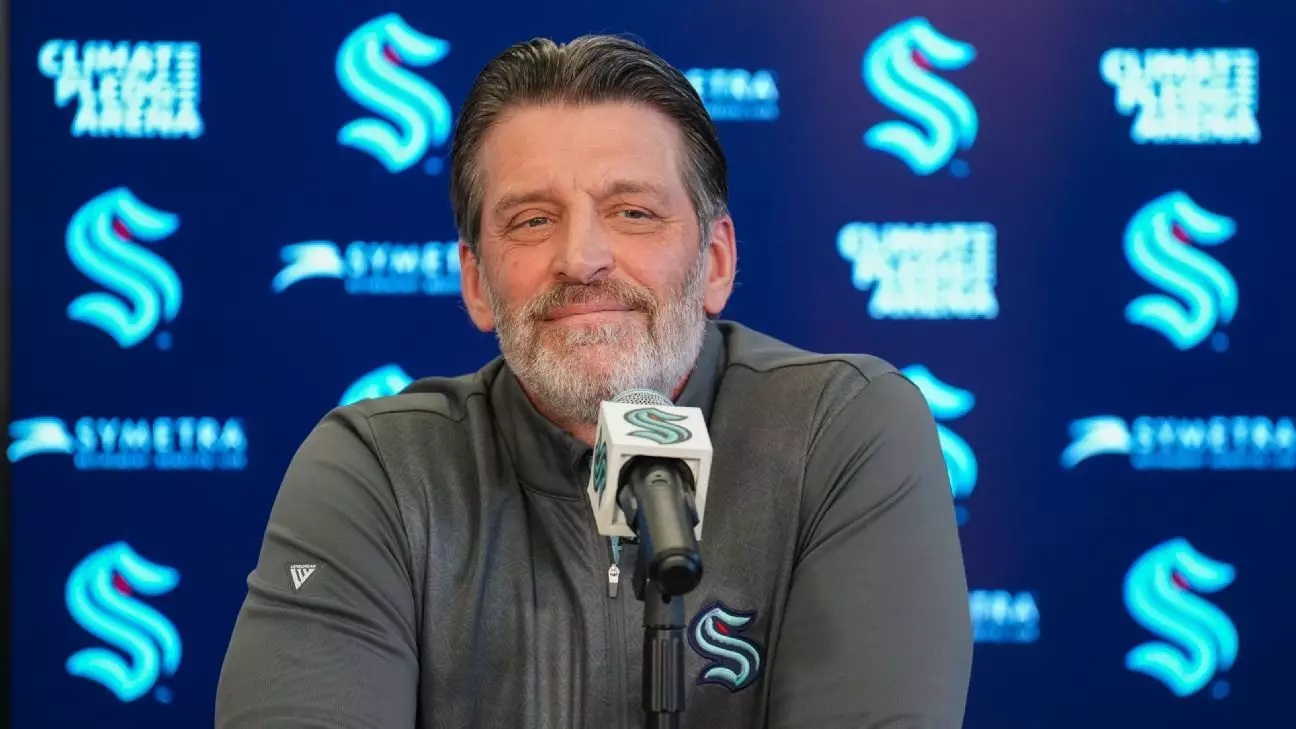Lane Lambert’s recent appointment as head coach of the Seattle Kraken has stirred excitement and curiosity across the hockey community. Announced officially during a press conference at their practice facility, Lambert finds himself in a unique position: he feels no external pressure to transform a struggling franchise into a playoff contender. Yet, it’s clear from his own statements that he sets the expectations higher than the current reality indicates. His belief that there is a direct path from hard work and integrity to success lays the groundwork for his vision for the team.
Lambert is stepping into the role after serving as the associate head coach with the Toronto Maple Leafs, a team that showcased an impressive season but faltered in the high-stakes arena of the playoffs. Transitioning from a team that won the Atlantic Division to leading a franchise with less success introduces an alluring juxtaposition of ambition and pragmatism. Lambert carries with him invaluable lessons learned from his time in Toronto, which he hopes to apply in his new environment.
A Trial by Fire
Lambert takes over from Dan Bylsma, who was dismissed after a single season at the helm. The Kraken’s underwhelming performance, registering a disappointing 35 wins against 41 losses, left the franchise yearning for a resurgence. The alarming reality is that the Kraken have only made the playoffs once in four years, placing Lambert under the spotlight of immediate scrutiny from fans and media alike. As he embarks on the journey, the urgency to shift the franchise’s fortunes is palpable, but Lambert seems prepared for the task at hand.
General Manager Jason Botterill identified Lambert as the right fit, emphasizing his ability to bridge the gap between experienced players and ambitious young talent. Lambert’s approach not only involves fostering relationships with on-ice veterans but also nurturing emerging stars, which is critical as the Kraken looks to build a cohesive team dynamic.
Addressing Immediate Concerns
Statistical analysis reveals the startling deficiencies in the Kraken’s gameplay. Ranked poorly in crucial categories such as power play efficiency and penalty killing, Lambert has acknowledged that immediate improvements in these areas are essential for the team’s success. Prior to his hiring, the franchise lacked a robust system that could rally both veterans and newcomers alike. Lambert’s experience—particularly in transforming the Toronto Maple Leafs’ special teams from a lowly 23rd to a commendable fourth—provides a hopeful preview of what’s to come in Seattle.
While Lambert acknowledges the challenges ahead, he believes firmly in building a strong foundation and imposing a structured game plan. Emphasizing that not all changes can happen overnight, he intends to instill his systems gradually, focusing on the big picture while also demanding accountability from players. His experience as a coach exemplifies a balanced approach of urging performers to be better without sacrificing the team’s unity.
Learning from the Past
Lambert’s coaching career has not been without its trials. His brief head coaching stints, particularly with the New York Islanders, taught him valuable lessons in leadership and the cyclical nature of sport. After being dismissed mid-season in his second year, Lambert reflected deeply on his style and decisions, critiquing himself with a critical eye. This introspection is vital; he understands that adapting and evolving are not just key for climatic breakthroughs but also essential for personal growth.
The reality of coaching is that past experiences, both positive and negative, shape one’s philosophy. The teams he has previously worked with collectively made the playoffs on ten occasions, marking him as a capable candidate. However, every new team presents a fresh set of hurdles. Lambert seems intent on applying newfound wisdom to ensure that this cycle does not repeat itself for the Kraken.
Talent Meets Opportunity
As Lambert steps into this pivotal role, he inherits a roster that boasts both seasoned veterans and promising young talent. The likes of Jaden Schwartz and Jared McCann represent a stable core, while rookies like Matty Beniers strike an exciting chord for the future. Lambert recognizes the delicate balance of managing these dynamics and aims to curate an environment where veterans guide emerging players, while also fostering a culture of competition and excellence.
What remains to be seen is whether Lambert can galvanize this burgeoning talent into a cohesive unit capable of contending for the playoffs, and potentially taking the franchise to new heights. The expectations are high, but Lambert’s steadfast belief in the process may just be the catalyst needed for a dramatic turnaround. In this regard, the journey for Seattle’s newest head coach is not merely about wins or losses, but about instilling a winning culture that the franchise can build upon for years to come.

